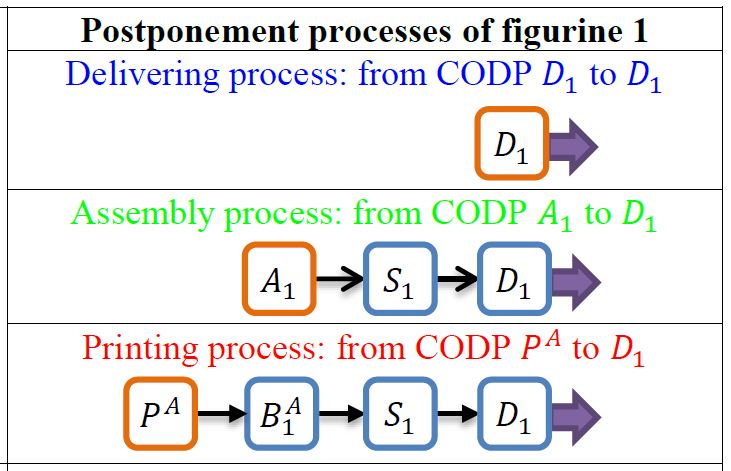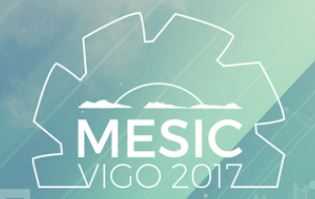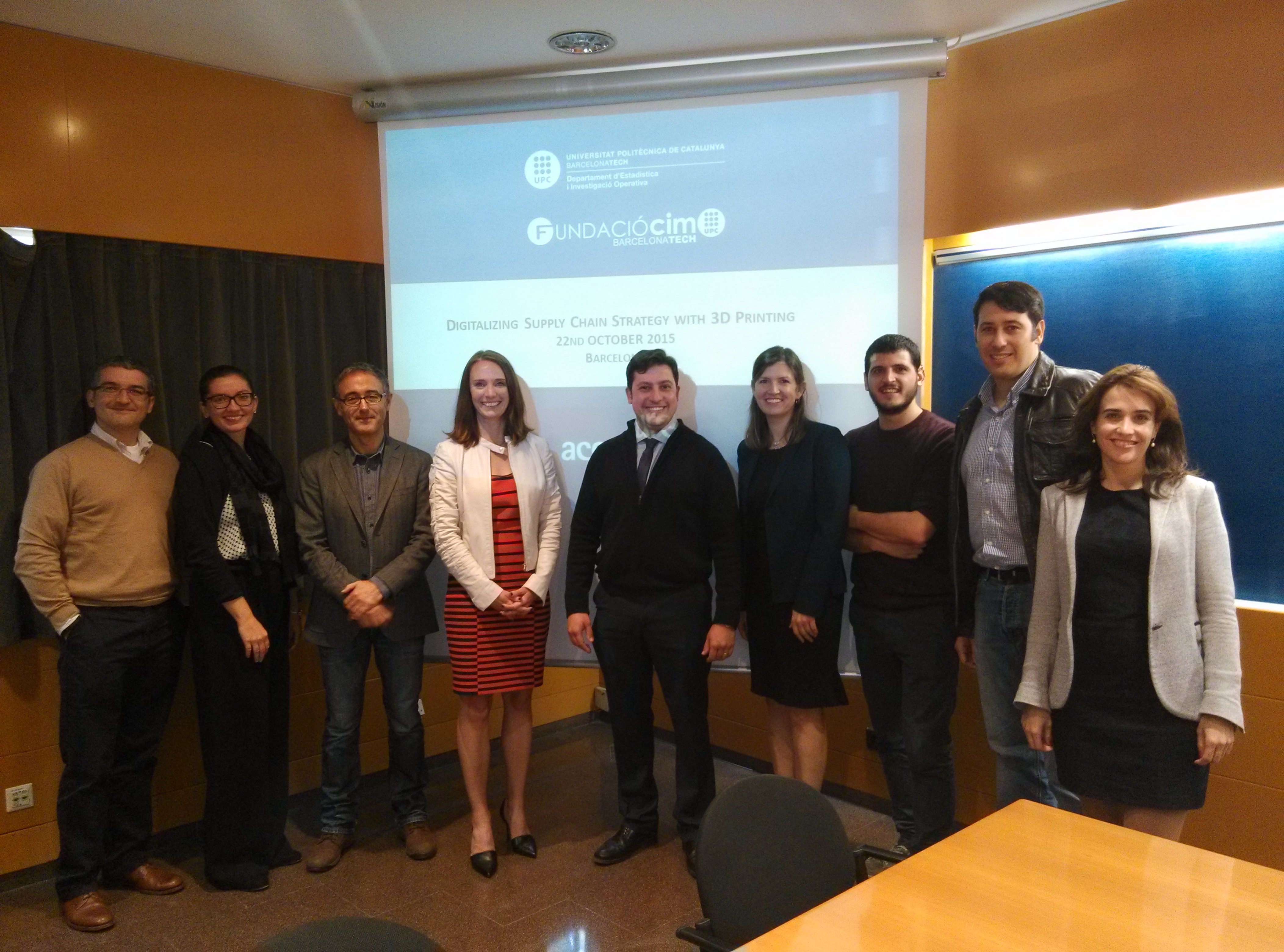3D printing
New paper published in International Journal of Production Research.
Tue, 07/21/2020 - 16:46 — admin The paper entitled Optimal Postponement in Supply Chain Network Design Under Uncertainty: An Application for Additive Manufacturing (preprint ) has been published in the International Journal of Production Research. This paper is the result of projects Strategical Models in Supply Chain Design, and Digitalizing Supply Chain Strategy with 3D Printing a successful collaboration between GNOM with Accenture Technology Labs (Silicon Valley), Accenture Analytics Innovation Center (Barcelona) and the Fundació CIM-UPC. This study This study presents a new two-stage stochastic programming decision model for assessing how to introduce some new manufacturing technology into any generic supply and distribution chain. It additionally determines the optimal degree of postponement, as represented by the so-called customer order decoupling point (CODP), while assuming uncertainty in demand for multiple products. Finally, it presents and analyses a case study for introducing additive manufacturing technologies.
The paper entitled Optimal Postponement in Supply Chain Network Design Under Uncertainty: An Application for Additive Manufacturing (preprint ) has been published in the International Journal of Production Research. This paper is the result of projects Strategical Models in Supply Chain Design, and Digitalizing Supply Chain Strategy with 3D Printing a successful collaboration between GNOM with Accenture Technology Labs (Silicon Valley), Accenture Analytics Innovation Center (Barcelona) and the Fundació CIM-UPC. This study This study presents a new two-stage stochastic programming decision model for assessing how to introduce some new manufacturing technology into any generic supply and distribution chain. It additionally determines the optimal degree of postponement, as represented by the so-called customer order decoupling point (CODP), while assuming uncertainty in demand for multiple products. Finally, it presents and analyses a case study for introducing additive manufacturing technologies.
A new contribution on incorporating additive manufacturing to product supply chains
Thu, 08/31/2017 - 23:00 — admin A new result of the research project Digitalizing Supply Chain Strategy with 3D Printing with Accenture TechLabs and Center for Analytics has been presented in the Manufacturing Engineering Society International Conference 2017 , MESIC 2017. The study compares different possible production strategies for a product (via conventional technologies and Additive Manufacturing) and assesses the degree of postponement that it would be recommended in order to meet a certain demand distribution. The problem solving is calculated by a program containing a stochastic mathematical model which incorporates extensive information on costs and lead times for the required manufacturing operations. This study was published in Procedia Manufacturing.
A new result of the research project Digitalizing Supply Chain Strategy with 3D Printing with Accenture TechLabs and Center for Analytics has been presented in the Manufacturing Engineering Society International Conference 2017 , MESIC 2017. The study compares different possible production strategies for a product (via conventional technologies and Additive Manufacturing) and assesses the degree of postponement that it would be recommended in order to meet a certain demand distribution. The problem solving is calculated by a program containing a stochastic mathematical model which incorporates extensive information on costs and lead times for the required manufacturing operations. This study was published in Procedia Manufacturing.
Comparison of production strategies and degree of postponement when incorporating additive manufacturing to product supply chains
Thu, 08/31/2017 - 23:00 — admin| Publication Type | Proceedings Article |
| Year of Publication | 2017 |
| Authors | J. Minguella-Canela; A. Muguruza; D.R. Lumbierres: F.-Javier Heredia; R. Gimeno; P. Guo; M. Hamilton; K.Shastry, S.Webb |
| Conference Name | Manufacturing Engineering Society International Conference 2017, MESIC 201 |
| Series Title | Procedia Manufacturing |
| Volume | 13 |
| Pagination | 754-761 |
| Conference Start Date | 18/06/2017 |
| Publisher | Elsevier |
| Conference Location | Vigo, Spain |
| Editor | Jorge Salguero, Enrique Ares |
| ISSN Number | 2351-9789 |
| Key Words | Additive Manufacturing; Ultra-postponement; Supply Chain; research; paper |
| Abstract | The best-selling products manufactured nowadays are made in long series along rigid product value chains. Product repetition and continuous/stable manufacturing is seen as a chance for achieving economies of scale. Nevertheless, these speculative strategies fail to meet special customer demands, thus reducing the effective market share of a product in a range. Additive Manufacturing technologies open promising product customization opportunities; however, to achieve it, it is necessary to delay the production operations in order to incorporate the customer’s inputs in the product materialization. The study offered in the present paper compares different possible production strategies for a product (via conventional technologies and Additive Manufacturing) and assesses the degree of postponement that it would be recommended in order to meet a certain demand distribution. The problem solving is calculated by a program containing a stochastic mathematical model which incorporates extensive information on costs and lead times for the required manufacturing operations. |
| URL | Click Here |
| DOI | https://doi.org/10.1016/j.promfg.2017.09.181 |
| Export | Tagged XML BibTex |
Comparison of production strategies and degree of postponement when incorporating additive manufacturing to product supply chains
Thu, 07/27/2017 - 13:34 — admin| Publication Type | Conference Paper |
| Year of Publication | 2017 |
| Authors | J. Minguella-Canela; A. Muguruza; D.R. Lumbierres; F.-Javier Heredia; R. Gimeno; P. Guo; M. Hamilton; K. Shastry; S. Webb |
| Conference Name | Manufacturing Engineering Society International Conference 2017, MESIC 2017, 28-30 |
| Conference Date | 28-30/07/2017 |
| Publisher | Elsevier |
| Conference Location | Vigo, Spain |
| Type of Work | Contributed presentation |
| Key Words | research; Additive Manufacturing; Ultra-postponement; Supply Chain; stochastic programming |
| Abstract | The best-selling products manufactured nowadays are made in long series along rigid product value chains. Product repetition and continuous/stable manufacturing is seen as a chance for achieving economies of scale. Nevertheless, these speculative strategies fail to meet special customer demands, thus reducing the effective market share of a product in a range. Additive Manufacturing technologies open promising product customization opportunities; however, to achieve it, it is necessary to delay the production operations in order to incorporate the customer’s inputs in the product materialization. The study offered in the present paper compares different possible production strategies for a product (via conventional technologies and Additive Manufacturing) and assesses the degree of postponement that it would be recommended in order to meet a certain demand distribution. The problem solving is calculated by a program containing a stochastic mathematical model which incorporates extensive information on costs and lead times for the required manufacturing operations. |
| URL | Click Here |
| Export | Tagged XML BibTex |
Optimal Supply Chain Strategy through Stochastic Programming
Mon, 07/18/2016 - 19:11 — admin| Publication Type | Tesis de Grau i Màster // BSc and MSc Thesis |
| Year of Publication | 2016 |
| Authors | Daniel Ramon Lumbierres |
| Director | F.-Javier Heredia |
| Tipus de tesi | MSc Thesis |
| Titulació | Master in Statistics and Operations Research |
| Centre | Faculty of Mathematics and Statistics |
| Data defensa | 27/07/2016 |
| Nota // mark | 9.5 Excel·lent MH (A+ with Honors) |
| Key Words | teaching; supply chain; 3D printing; Postponment; stochastic programming; Accenture; MSc Thesis |
| Abstract | In this project, a new two-stage stochastic programming decision model has been developed to assess: (a) the convenience of introducing 3D printing into any generic manufacturing process, both single and multi-product; and (b) the optimal degree of postponement known as the customer order decoupling point (CODP) while also assuming uncertainty in demand for multiple markets. To this end, we propose the formulation of a generic supply chain through an oriented graph that represents all the deployable alternative technologies. These are defined through a set of operations for manufacturing, assembly and distribution, each of which is characterized by a lead time and cost parameters. Based on this graph, we develop a mixed integer two-stage stochastic program that finds the optimal manufacturing technology to meet the demand of each market, the optimal production quantity for each operation, and the optimal CODP for each technology. The results obtained from several case studies in real manufacturing companies are presented and analyzed. The work presented in this master’s thesis is part of an ongoing research project between UPC and Accenture. |
| DOI / handle | http://hdl.handle.net/2117/88818 |
| URL | Click Here |
| Export | Tagged XML BibTex |
Optimal Supply Chain Strategy and Postponement Degree with 3D Printing
Mon, 07/18/2016 - 19:04 — admin| Publication Type | Conference Paper |
| Year of Publication | 2016 |
| Authors | Daniel Ramon Lumbierres; Asier Muguruza; Robert Gimeno Feu; Ping Guo; Mary Hamilton; Kiron Shastry; Sunny Webb; Joaquim Minguella; F.-Javier Heredia |
| Conference Name | 28th European Conference on Operational Research |
| Series Title | Conference Handbook |
| Pagination | 330 |
| Conference Date | 3-6/07/2016 |
| Conference Location | Poznan, Poland |
| Type of Work | contributed presentation. |
| Key Words | research; supply chain; 3D printing; stochastic programming; postponment; modeling; additive manufacturing |
| Abstract | In this contribution we would like to present the results of a research project developed by Accenture and BarcelonaTech aiming at studying the advantages of ultra-postponement with 3D printing using the analytical tools of operational research. In this project a new two-stage stochastic programming decision model has been developed to assess (a) the convenience of the introduction of 3D printing in any generic supply chain and (b) the optimal degree of postponement, the so called Customer Order Decoupling Point (CODP), assuming uncertainty in demand for multiple markets. To this end we propose the formulation of a generic supply chain through an oriented graph that represents all the alternative technologies that can be deployed, defined through a set of operations for manufacturing, assembly and distribution, each one characterized by a lead time and cost parameters. Based on this graph we develop a mixed integer two-stage stochastic program that finds the optimal manufacturing technology to meet the demand of each market, the optimal production quantity for each operation and the optimal CODP for each technology. The results obtained with several case studies from real manufacturing companies are presented and analyzed. |
| URL | Click Here |
| Export | Tagged XML BibTex |
Digitalizing Supply Chain Strategy with 3D Printing
Fri, 10/30/2015 - 16:56 — admin| Publication Type | Funded research projects |
| Year of Publication | 2015 |
| Authors | F.-Javier Heredia; Joaquim Minguella |
| Type of participation | leader |
| Duration | 06/2015-07/2016 |
| Funding organization | Accenture Technology Labs |
| Partners | Accenture Technology Labs (Silicon Valley), Accenture Analytics Innovation Center (Barcelona), Fundació CIM-UPC |
| Budget | 25.000$ |
| Project code | I-01326 |
| Key Words | research; supply chain optimization; manufacturing; 3D printing; project; private; competitive; Accenture |
| Abstract | The aim of this research project is to study the advantages of the ultra-postponement with 3D printing (UP3DP) using the analytical tools of operational research (OR). 3D printing (3DP) is a revolutionary technology that is changing the paradigm of the supply chain management allowing delayed and tailored production under demand. However it is still to determine to which extend producers can take profit of the massive integration of this technology in their supply chain strategy: how to distribute 3DP devices among the different production plants? Which kind of technology is more appropriate? What are the benefits of this integration, both from the point of view of the manufacturer’s profit and client’s experience? We expect to find answers to all these questions with the help of the mathematical optimization models and algorithms of the operational research. |
| Export | Tagged XML BibTex |
Accenture Open Innovation university grant
Fri, 10/30/2015 - 15:02 — adminAs a part of the Accenture Open Innovation initiative, Accenture - Tech Labs has awarded 11 research grants to top universities around the world to significantly broaden and deepen the relationships between Accenture’s technology research and development (R&D) groups and leading university researchers.

The project "Digitalizing Supply Chain Strategy with 3D Printing", lead by professor F.-Javier Heredia (GNOM-UPC) and professor Joaquim Minguella, (Fundació CIM-UPC), was one of 11 awarded projects. This research project aims at studying the advantages of ultra-postponement with 3D printing by using analytical tools and mathematical optimization models and algorithms, exploring how to transform supply chain management by allowing delayed and tailored production in the location where demand occurs. The project will be developped in collaboration with the Accenture Analytics Innovation Center (Barcelona) and Accenture Technology Labs (Silicon Valley). In the image, the attendants to the first in person meeting, held at the Faculty of Matematics and Statistics and Fundació CIM, with representants from Accenture Analytics, Accenture Technology Labs, GNOM-UPC and FCIM-UPC.
